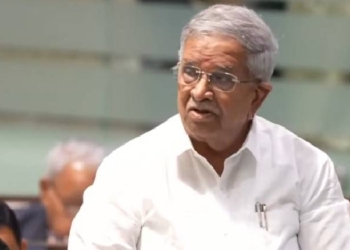New Delhi: Delhi experienced the worst air quality in the month of October since 2020 this year, with meteorologists attributing the alarming levels of pollution to the significant lack of rainfall during the month.
According to data from the Central Pollution Control Board (CPCB), Delhi reported an average Air Quality Index (AQI) of 210 in October 2023.
This was consistent with the AQI recorded in October 2022 but significantly worse than the AQI of 173 recorded in October 2021.
One of the key contributing factors to this deteriorating air quality was the paucity of rainfall.
In October 2023, Delhi witnessed just one rainy day, resulting in a mere 5.4 mm of precipitation. This was a stark contrast to the previous years, with October 2022 seeing six rainy days and 129 mm of rainfall, and October 2021 registering seven rainy days with 123 mm of precipitation.
The Commission for Air Quality Management (CAQM) highlighted that the average wind speed in Delhi during October 2023 was relatively low. Additionally, periods of absolutely “still” weather conditions were observed throughout the month, which prevented the dispersion of pollutants and exacerbated the air quality issue.
Data from the CPCB revealed that throughout October 2023, Delhi did not record a single day with ‘good’ air quality. This is in stark contrast to 2022 when there were two such days and 2021 when there was one day with ‘good’ air quality.
However, it’s worth noting that the CAQM reported that Delhi registered an AQI of 172 from January 1 to October 31 in 2023, making it the second-best performance for the corresponding period in six years.
The city only had better air quality during this period during the Covid-19 pandemic-affected year of 2020.
In 2022, 2021, 2019, and 2018, the average AQI during this period ranged from 179 to 201, as stated by the CPCB.
Meanwhile, on Tuesday, for the fourth consecutive day, the air quality in the national capital continued to remain in the “very poor” category as the overall Air Quality Index (AQI) of the city reached 336 on Tuesday, according to data from the System of Air Quality and Weather Forecasting And Research (SAFAR).
The AQI at Dhirpur with PM 2.5 was at 380, under very poor category.
The AQI between zero and 50 is considered “good”, 51 and 100 “satisfactory”, 101 and 200 “moderate”, 201 and 300 “poor”, 301 and 400 “very poor”, and 401 and 500 “severe”.
At Pusa, the AQI recorded PM 2.5 at 311 or “very poor”. At Lodhi Road, the Air Quality Index with PM 2.5 concentration was at 306, or “very poor” and the PM 10 stood at 201 under the “poor” category.
At IIT Delhi station, the PM 2.5 was at 329, or “very poor” while the PM 10 reached 188, in “moderate” category.
The Air Quality Index at the city’s Mathura Road was under “poor” category with PM 2.5 at 286 and PM 10 concentration at 362 under “very poor” category.
According to the forecast from SAFAR, the air quality of the city will deteriorate further under the “very poor” category with PM 2.5 reaching at 342 and the PM 10 concentration at 270 under “poor” category on Wednesday.
(IANS)
















